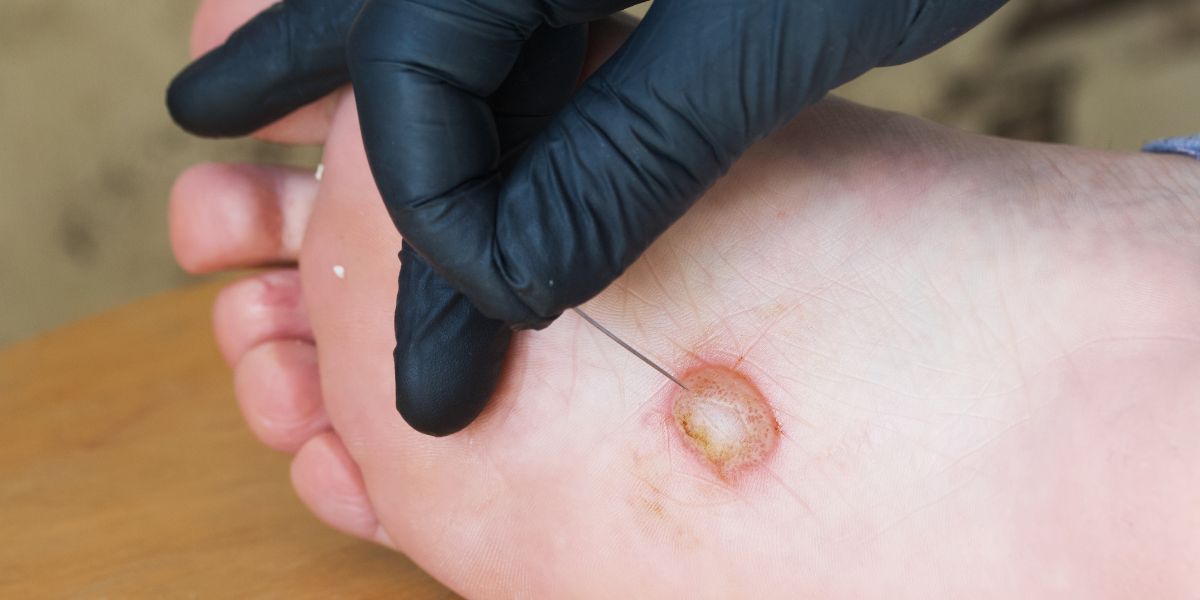Over a quarter (25 percentage) of American seniors are affected by diabetes, a condition that can cause a myriad of problems. According to one alarming figure about 10 to 15 percent individuals with diabetes are plagued by leg and feet ulcers. These seemingly innocuous wounds, if left unattended, may escalate to a point where diabetic foot amputation becomes an unfortunate reality. A majority of Amputations are caused by foot ulcers. This underscores the importance of taking preventive measures and the need for a rigorous approach to care.
Diabetes management is a difficult issue that requires an integrated approach that goes beyond glucose control. Daily foot care emerges as the keystone in this effort and serves as a major defense against the looming threats of diabetes-related amputations.

Understanding the Landscape
It is a challenge to navigate the complicated world of diabetes and complications. The high prevalence of foot and leg ulcers among diabetic patients underscores the necessity for proactive treatment. The data is stark and it is clear that understanding the complexity of these issues will be essential in fighting against amputations.
The Amputation Conundrum
Amputations are a serious threat for those with diabetes. This is a personal reality that is more than the statistics. It’s a long road from a minor wound to the possibility of having to be amputated due to diabetes.
Daily Foot Care: A Protection from Amputation
Daily foot care is the foundation for prevention of diabetes-related amputations. This goes beyond an every-day foot care routine. It’s also a methodical practice to identify and address problems before the problem escalates. This routine every day includes everything from checking the feet for any wounds to making sure they are properly moisturized.
Vascular specialists: their roles
Although vascular specialists don’t directly deal with diabetes however their expertise plays an important role in reducing the risks caused by the disease. The goal for treating patients is to increase blood flow to the lower extremities. This will to reduce pain and accelerate healing. The objective of this collaborative method is to avoid the amputations caused by diabetes and reduce the consequences.
Strategies to Prevent Amputation
To be able to navigate the dangers of amputation due to diabetes you require a combination of awareness, vigilance and expert intervention. Adopting a proactive approach is vital for individuals suffering from diabetes. Regular checkups, with healthcare professionals including vascular specialists can contribute to the early detection.
Leg Ulcers and Beyond The Triggers to Consider
The leg ulcers, frequently the precursors to more severe complications, require attention and knowledge. It is important to identify the triggers that can result in leg ulcers. The cause could be poor circulation, neuropathy or a mix of causes, identifying the root causes allows for targeted intervention and individualized treatment.
Education as empowerment
Essential is educating those suffering from diabetes about the risks and preventative measures. Education initiatives, both in healthcare settings and the broader community, can make the difference between awareness and taking action. Understanding the potential consequences of seemingly unimportant wounds may prompt early responses that could prevent diabetic foot amputation.
Private Battles, Collective Triumphs
Fighting diabetes-related complications is not an individual battle, it’s a team effort. Joining support groups with your healthcare provider or in your local community can be an excellent means to exchange experiences and gain knowledge, as well as learn techniques for dealing with the situation. When you’re faced with the risk of amputation and emotional trauma, the impact can be overwhelming. Community support networks can provide support and peace.
In the end, the path through diabetes, leg ulcers, and the looming risk of losing a foot is multi-faceted. Foot care should be the first priority, but the expertise of a vascular specialist is essential in the prevention of complications. People with diabetes who are cognizant, adopt preventive measures as well in fostering a system of support, can navigate through the maze of complications with confidence and strength which reduces the risk of amputation.